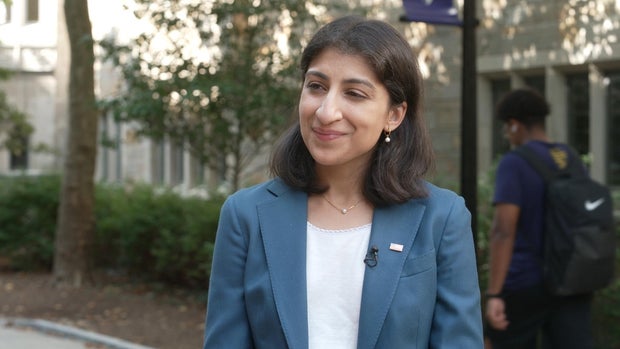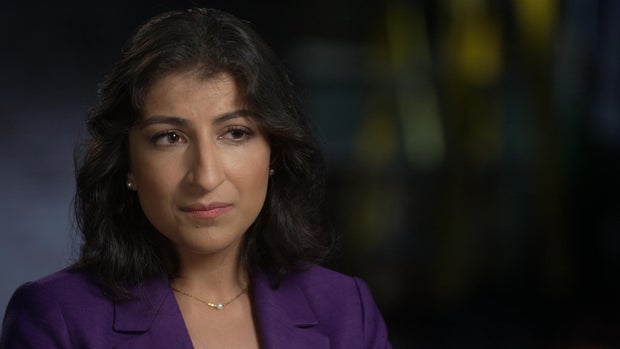As the youngest ever Federal Trade Commission chair, Lina Khan has taken on scores of companies and preached the perils of business monopolies.
Her pursuit of big business represents a policy shift after a decades-long FTC hands-off approach allowing most mergers and acquisitions. Under President Biden, however, the FTC and Justice Department have unleashed a crackdown and sued scores of big companies, including TicketMaster, Nvidia, Meta, Microsoft, Apple and Amazon. Some worry going after tech giants could have a domino effect, destabilizing the economy.
“But we also should worry about the destabilizing effect that can arise from companies believing that they’re above the law, and they can be reckless, take massive risks in ways that can crash the economy and then they can get away with just a slap on the wrist,” Khan said in a recent 60 Minutes interview with correspondent Lesley Stahl. “And that creates a destabilization, too.”
The shift in antitrust policy
The Federal Trade Commission was established to protect consumers and promote competition between businesses.
Since President Ronald Regan’s time in the White House, antitrust regulators have done little to interfere in many mergers and acquisitions. It was a policy adopted by all presidents since then, including former Presidents Bill Clinton and Barack Obama. Then President Biden put an end to it.
“We are now 40 years into the experiment of letting giant corporations accumulate more and more power, and what have we gotten from it? Less growth, weakened investment, fewer small businesses,” Mr. Biden said in 2021 — the same year he appointed Khan to the FTC.
60 Minutes
It’s a revolution and Khan is its face. While still a law student, she wrote a paper for the Yale Law Journal called “Amazon’s Antitrust Paradox,” contending that even though its prices are low, Amazon is still a monopoly.
Less than five years later, President Biden made Khan, 32 at the time, head of the agency that polices Amazon.
Taking on the Big Five tech companies
Last year, the Federal Trade Commission and 17 state attorneys general filed an antitrust case against Amazon, alleging the retailing giant illegally wields monopoly power to maintain higher prices, hurting customers and weakening competition.
“Our investigation uncovered that Amazon’s illegal practices were actually raising prices for consumers because it had illegally muscled out rivals, locked them out of the market in ways that if you had more competition that Amazon hadn’t squashed, consumers would be even better off,” Khan told 60 Minutes.
Amazon denies doing anything illegal and says if Khan wins, prices will go up.
Khan and the FTC have blocked, or tried to block, a number of Silicon Valley’s big companies from buying smaller companies.
“In the technology markets, we went through a couple of decades where we saw over 800 acquisitions by the five big players, not a single one of which was blocked. And some of those we realize ended up leading to significant harm,” Khan said.
Khan said the FTC has identified a string of mergers that were not blocked or challenged by previous FTC administrations, even though the current FTC under her leadership — and operating under Biden’s mandate — believe they are illegal.
Confronting pushback from companies
The courts don’t always side with the FTC, and Khan lost a couple of big cases, including one against Microsoft and another against Meta.
While Khan is feared and loathed in many corporate boardrooms, and even viewed by some as a zealot and a bully, she says the FTC is doing its job by enforcing the law, adding that of the thousands of deals proposed every year, the FTC and DOJ collectively investigate “maybe 2% or 3%.”
That might not sound like a lot, but startup founders complain that she’s spooking investors so much that she’s stifling innovation. Others fear Khan chasing the tech giants will cause a domino effect. Earlier this month, the stock market plunged after it was reported that Khan’s counterpart at the Justice Department subpoenaed chip maker Nvidia.
60 Minutes
Khan is also facing lawsuits from corporations who want the FTC to be reined in, setting up a possible showdown at the Supreme Court over the fate of the agency.
“I think one challenge that agencies can face is when they shrink their own powers and authorities by not actually using the authorities that Congress has given them,” Khan said.
Khan’s fans — both liberals and conservatives
Even while dealing with pushback, Khan has fervent admirers. She attends events around the country that she calls her “listening tours.” She’s often swarmed by young people taking selfies, small business owners giving her cards, progressive politicians and union members.
She’s also surprisingly popular with some MAGA Republicans. Sen. JD Vance, the Republican nominee for vice president, has expressed some admiration for Khan.
“I don’t agree with Lina Khan on every issue, to be clear, but I think that she’s been very smart about trying to go after some of these big tech companies,” he previously said.
There’s even a nickname for conservatives who support Khan: Khan-servatives.
Still, Khan is unlikely to keep her job if former President Donald Trump wins the election. It’s also unclear if Khan would keep her job if Vice President Kamala Harris wins. Some of Harris’ biggest donors are people who want Khan out of the FTC.
“My focus is not listening to what CEOs are saying on TV,” Khan said. “It’s important in these jobs to really stay focused and block out a lot of the noise.”




